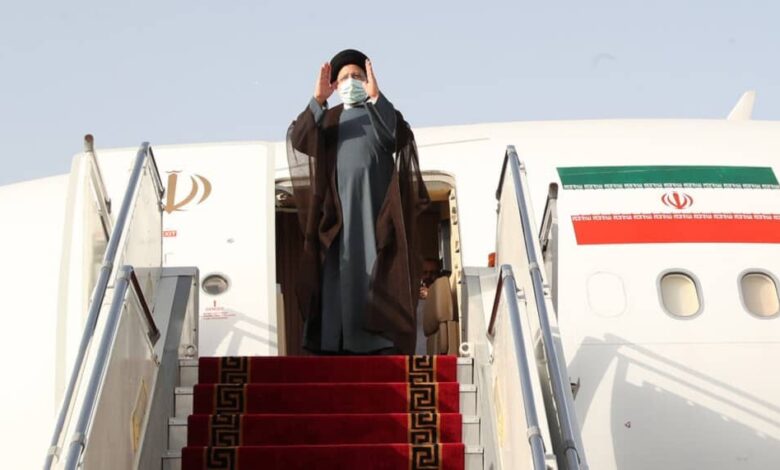What Did Iran’s Regime Gain from Raisi’s Pakistan Visit

Written by
Shahriar Kia
Three-minute read
In less than three months following the exchange of cross-border attacks between the Iranian regime and Pakistan, Ebrahim Raisi, the Iranian regime’s president, undertook an official trip to the eastern neighbor country. The purpose was to convey a message from Tehran to its audiences, emphasizing that the regime isn’t as internationally isolated as perceived.
A 28-article statement issued by the Iranian regime’s Ministry of Foreign Affairs outlines numerous agreements and areas of mutual interest between the two parties. However, notably absent from the statement are references to recent serious and sensitive disputes that have unfolded in recent months.
On January 16, the Islamic Revolutionary Guard Corps (IRGC) launched a missile strike into Pakistani territory. The target was purportedly anti-regime Baluchi fighters, who opposed the regime’s oppression and fought for their rights. In retaliation on January 18, the Pakistani government responded to the IRGC’s missile barrage with strong political condemnation. Pakistan summoned its ambassador from Iran and refused entry to the Iranian ambassador, condemning the attack that resulted in the deaths of two children and sparking a diplomatic challenge.
In the wake of Islamabad’s strong reaction, Tehran’s deafening silence spoke volumes.
Years before, in alignment with United States sanctions against the Iranian regime, Pakistan had halted a gas pipeline project, further infuriating Tehran. The pipeline deal, inked in 2010, aimed to supply 750 million to 1 billion cubic feet of natural gas daily for 25 years from Iran’s South Pars gas field to Pakistan, addressing Pakistan’s escalating energy demands. The pipeline spanned 1,900 kilometers, with 1,150 kilometers in Iran and 781 kilometers in Pakistan.
#Iran News: #Pakistan Officially Designates Tehran-backed Zainabiyoun Brigade as Terrorist Organizationhttps://t.co/ZEpB8DCJRm
— NCRI-FAC (@iran_policy) April 12, 2024
Tehran claims to have invested $2 billion to construct its section of the pipeline, ready for export. However, Pakistan stalled construction and later shelved the project temporarily, citing international sanctions against Iran as the rationale. According to Reuters, despite Ebrahim Raisi’s visit to Pakistan, Islamabad’s position on the pipeline project remains unchanged.
Analysts suggest that a key aim of this trip is to tackle Tehran’s security concerns. Pakistani authorities have already detained numerous individuals associated with Tehran’s proxies, and in early April, Pakistan designated the Zeynabiyoun Brigade, Pakistani mercenaries working for the regime, as a terrorist organization. However, following Raisi’s trip, Iranian state media, primarily focused on showcasing achievements for the regime’s president, have remained silent on this issue.
Another notable aspect highlighted in state media outlets was the issue of a subdued reception for Raisi in Pakistan. Abdolreza Davari, an advisor to former regime president Mahmoud Ahmadinejad, remarked on his Twitter/X account, “During Raisi’s visit to Pakistan today, Pirzadeh, the Pakistani housing minister, went to the airport to welcome Raisi. However, during President Rouhani’s trip to Pakistan in 2016, Nawaz Sharif, the Pakistani Prime Minister, personally welcomed Rouhani at the airport, and Mamnoon Hussain, then Pakistani President also escorted Rouhani to the airport for his departure.”
#Iran News: #Pakistan Officially Designates Tehran-backed Zainabiyoun Brigade as Terrorist Organizationhttps://t.co/ZEpB8DCJRm
— NCRI-FAC (@iran_policy) April 12, 2024
Iranian state media emphasized Raisi’s receipt of an honorary doctorate from the University of Karachi, despite the fact that it was granted by the university’s vice chancellor rather than its president. However, according to Pakistani media reports, the university’s tradition of bestowing symbolic honors upon individuals without academic qualifications is met with disapproval.
This statement indicates Raisi’s current standing as the president of the regime among regional countries. The state-run news agency Khabaronline also reflected on this matter. On April 23, Khabaronline wrote, “Raisi’s foreign trips have been accompanied by controversies, from the cold reception by the Russians to Raisi’s family trip to the US, and now the recent trip to Pakistan and the associated cold reception incidents.”
The source added, “The lack of reception by Shahbaz Sharif, the Pakistani PM, upon Raisi’s arrival in the country was the first controversy. Another polemic of Ebrahim Raisi’s visit to Pakistan is the absence of the president’s aide.”
Khairullah Azad, a former Afghan diplomat, wrote on Twitter/X, “During Ebrahim Raisi’s trip to Pakistan, there was no progress on the Iran-Pakistan gas pipeline issue due to U.S. opposition. Additionally, the unfriendly attitudes of Shahbaz Sharif and General Asim Munir towards Iran, India’s presence in Iranian Baluchestan, and the increased use of proxy groups by both countries have also damaged bilateral relations.”
در سفر #ابراهیم_رئیسی به پاکستان، موضوع خط لوله گاز #ایران_پاکستان به دلیل مخالفت امریکا پیشرفتی نداشت.
افزون بر آن، دید غیر دوستانه شهباز شریف و جنرال عاصم منیر نسبت به ایران، حضور هند در بلوچستان ایران و افزایش استفاده هردو کشور از گروه های نیابتی نیز بر روابط دو کشور آسیب زده. pic.twitter.com/UJSv9ED616— Khairullah Azad (@azad_khairullah) April 24, 2024
In tandem with Raisi’s trips to Pakistan and Sri Lanka, the Argentine government called for the arrest of Iran’s Interior Minister, Ahmad Vahidi, citing his alleged involvement in the 1994 bombing of the Jewish Cultural Center in Buenos Aires.
Raisi, whose domestic reputation is marred by economic policy failures and a lack of substantive social initiatives beyond ceremonial provincial trips, seems to maintain a similar approach during his foreign engagements. Despite the bold headlines in state-controlled media outlets and the ambitious claims from his Foreign Ministry, it appears that Tehran’s core security and economic concerns have not been adequately addressed during this trip.

